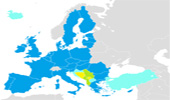In the past decade the EU has undergone a massive expansion in its member states – from 18 to 27 countries – taking in much of the eastern bloc as well as the likes of Cyprus and Malta.
Now EU enlargement is faced with a bigger challenge, the integration of the western Balkan nations, including Croatia, Serbia, Bosnia Herzegovina and Macedonia, while Iceland and Turkey are also knocking on the European Union’s (EU) door. But their respective roads towards membership all have obstacles which must be overcome.
Conditions for accession are set by the EU. An application to join the EU is considered to be eligible, if, first and foremost, the country asking for accession is democratic, peaceful, and is prepared to adjust its own legal framework to incorporate the entire body of EU law.
Arguably, the most symbolic set of accessions are the Balkan nations, all of which used to form part of Tito’s Yugoslavia. Tito’s death meant Yugoslavia’s disintegration. The Balkan Wars followed. They left atrocities, genocides, and countless human tragedies – all on Europe’s doorstep. The EU’s envoy to Bosnia-Herzegovina, Paddy Ashdown, famously said that the Balkans and the EU was “unfinished business”. He is right.
Croatia is in pole position to be the first to join, although its accession has taken longer than expected. Croatia had to face a 35-chapter negotiating agenda towards membership. 20 have been agreed to. 13 chapters are still under discussion while two others are mere formalities that will automatically close at the end of the accession negotiations.
Slovenia had blocked the opening of the defence chapter over a border dispute with Croatia that has existed since the break-up of Yugoslavia over 13 square kilometres of largely uninhabited land and a wedge of territorial water in and around Piran Bay. However, last June, a Slovenian referendum voted in favour of resolving the row through international arbitration.
Serbia’s application to join the EU is less straightforward. One of the stiffest hurdles facing Serbia is the fact that General Ratko Mladic and Goran Hadzic are wanted by the International Criminal Tribunal to face war crimes of genocide committed during the Balkan Wars, and are still at large. Until they face justice, Serbian accession is not going to happen.
Meanwhile, in March 2004, the Macedonian government submitted its application for membership in the EU. The accession process is largely hindered by the still unresolved dispute Macedonia has with Greece over its name. While the country prefers to be called by its constitutional name, Republic of Macedonia, the EU, acknowledging concerns raised by Greece, applies the compromise provisional reference introduced by the United Nations in 1993 and calls the country “the former Yugoslav Republic of Macedonia”.
Given that any new accession must be agreed to by all EU member states, Greece effectively has a veto power and has repeatedly threatened to block Macedonian accession unless the naming issue is resolved.
Joining the EU was not considered by the Icelandic government until the collapse of the country’s banking system in 2008. This, plus the attraction of joining the euro, led to a re-think with the new Icelandic government making an application in July 2009, aiming for accession by 2012.
However, there remain several unresolved issues. While Iceland is already compliant with most EU internal market law, its long-standing fishing disputes with neighbouring countries must still be resolved, and the final decision will be subject to a referendum.
Secondly, the Icelandic banking crisis led to a dispute with the UK and the Netherlands, both of whom lost several billion euros incurred by covering their citizens’ losses caused by Iceland’s bankruptcy. If Iceland doesn’t comply with these demands, then both countries might oppose Icelandic membership. On the other hand, if Iceland agrees to repay, the added debt this would incur would make it difficult for Iceland to adopt the euro.
Turkey is the icing on the EU’s enlargement cake, but also the most difficult. Turkey has wanted to join the EEC (now the EU) since the 1960s. Notwithstanding the fact that Turkey’s application is strongly supported by the UK, Sweden and Italy, it also has several opponents, including France, Germany, Greece and Cyprus.
The European Commission recommended that negotiations with Turkey should begin in 2005. Nearly five years have passed since then. Despite the fact that the Turkish government has started to improve its human rights record and the transparency of its judicial system, talks have been stalled by a number of domestic and external problems. The Cypriot issue, going back to the Turkish invasion of Cyprus in 1974, dividing the island nation in two different states, continues to be a major obstacle to negotiations.
Ankara is currently aiming to comply with EU laws by 2013, hoping that this could be the earliest date of its accession to the EU. However, this is a very optimistic target, and one which Brussels has refused to support as a deadline. On the contrary, many in Brussels believe that Turkey’s accession process will take at least until 2021.
So, while the door to EU membership remains open, the path is littered with obstacles. Joining the EU, even during its present difficulties, is a huge prize, particularly the right to have access to the world’s largest single market and an international currency. But getting there is harder than it seems.
www.independent.com.mt – It-Tnejn, 3 ta’ Dicembru, 2010
